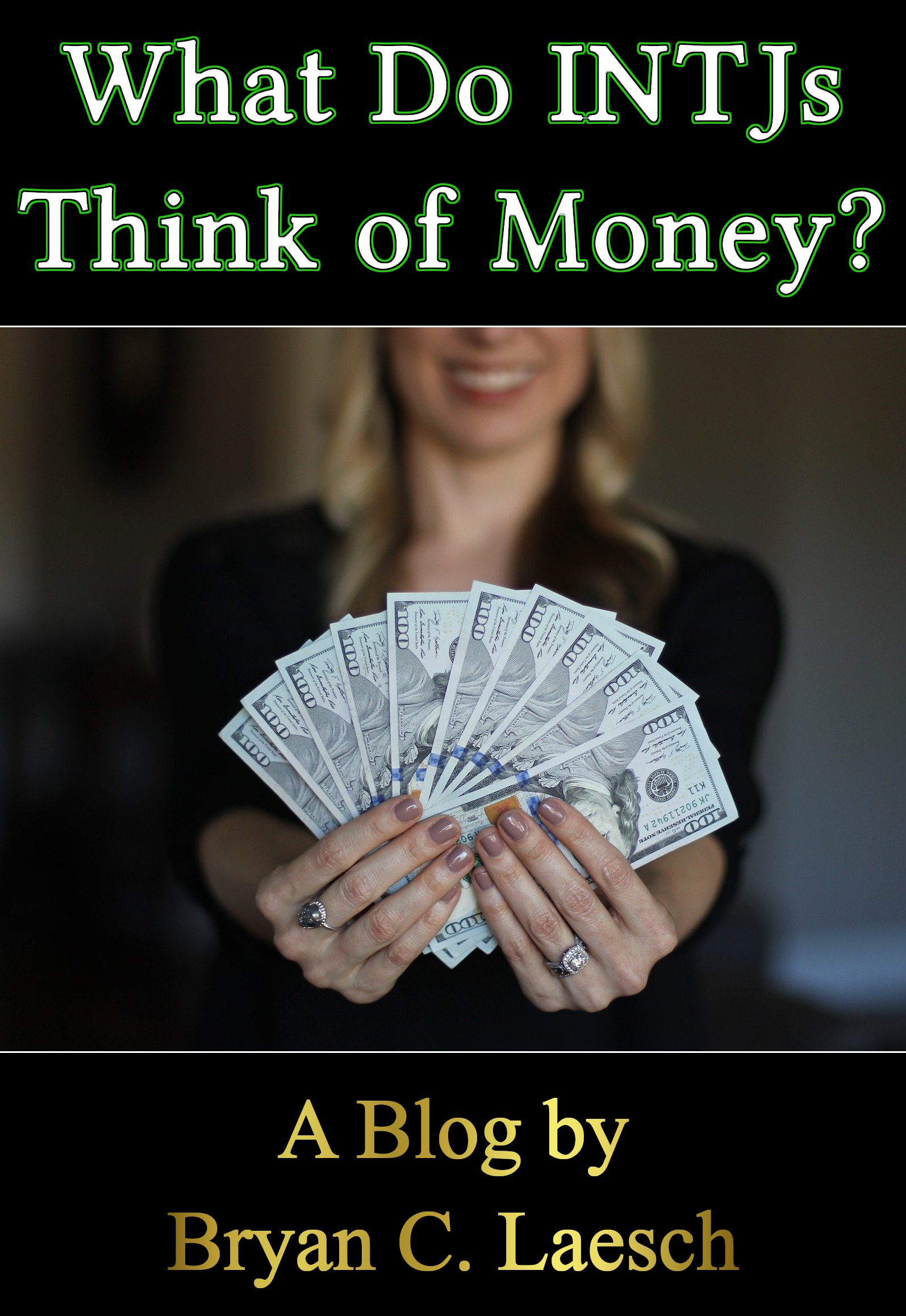Good news, everyone!
So, a few months ago, I wrote a bunch of blog drafts in preparation for my triumphant return to blogging. One of those blogs was about INTJs and investing because one of the things I got into during quarantine was finances—I learned about money, stocks, gold, fiat currency, and I even read “Rich Dad Poor Dad” by Robert Kiyosaki.
Anyway, the blog I wrote was about what sort of investments INTJs would make. It was an all right piece, but sort of basic. So, I decided to rewrite it, but this time I chose to focus on the general attitude and relationship that INTJs have with money. This blog will cover what they think of it, what they do with it, how they go about getting it, and what they would do if they despised it. So, let’s answer the question what do INTJs think of money.
Money Talks
So, money is a complex issue for INTJs.
Our primary function Ni doesn’t really care about the material world because Ni doesn’t think there’s any deep meaning or hidden truths in it, and Fi (our tertiary function) is sort of idealistic when it comes to money. It would prefer to live in a society where things were acquired through merit. But then there’s our auxiliary function Te and our inferior function Se. Te recognizes the need for money. It believes in the old saying, “Money isn’t everything, but everything takes money”. As a result, Te tries to convince Fi that capitalism does provide for a system of meritocratic currency, where diligence and hard work are rewarded with dollar bills. And then there’s Se which desires to experience the finer things in life, and so, it’s very pro-money.
As a result, INTJs are both pro- and anti-money. However, because they have Ni and Te on top of their function stack, they usually end up being more pro-money than anti-money. Ni isn’t really anti-money—it mostly doesn’t care, but if Te can convince it that money would assist in the search for the truth, or that an INTJ can get wealthy by peddling the truths and insights Ni has discovered hopefully leading to more, then Ni will happily pursue wealth. And as a result, three of the four functions are happy. But what about Fi?
Well, like I said, Te tries to convince Fi that capitalism is a sort of meritocracy, but Fi is quick to mention sell-outs and monopolies that lead to Mammon—the godless pursuit of the almighty dollar. Fi doesn’t want to lose its morals. So, what works better is if Te does something similar with Fi as it did with Ni—it suggests selling its character and morals. Not in the way that they would end up lost, but rather by producing goods or services that sell the ideals of hard work, ambition, loyalty, integrity, morality, etc. INTJs can be happy at any job that makes them significant capital, but only if that capital is used to fund a project that’s important to them. Therefore, it’s better if INTJs work in an industry where they can sell their high morals and truths. What industries are those? I can’t say for sure, but that is one of the reasons why I like writing—my characters can have my ideals and prove their veracity, and I make money off those ideals as result. So, in the end, all the functions are satisfied. But what do INTJs do with their money?
Money in the Bank!
Well, as I said regarding INTJ hobbies, INTJs don’t do anything solely for the fun of it. They don’t go after anything solely for the purpose of having it or having done it. True, INTJs do possess Se, meaning they are prone to enjoying variety and new experiences, but with Se on the bottom and Ni on the top their function stack, all variety and new experiences need to teach something or impart some sort of value. Going back to money, INTJs don’t pursue wealth just because they want to be rich or have a big bank account. That’s really only cool for about thirty seconds, but then it isn’t. So, INTJs put their money to use. What sort of use?

Well, there are a number of things an INTJ will spend his money on; he might use it to buy literature and further his pursuit for the truth (Ni), he may set up a rainy day account (Te), he may donate it to a cause he deems worthy (Fi), or he may buy himself something nice (Se), but that all belies the real reason an INTJ goes after wealth. Ultimately, what an INTJ wants more than anything is freedom.
With enough wealth, an INTJ can do whatever he wants whenever he wants with whomever he wants. Money is a force multiplier—it’s power. It allows him to live his life however he wants without interference or interruption from others. That may seem a little manic, but you have to remember the other things an INTJ wants in his life: truth, meaning, and insight. So long as he isn’t committing acts against nature like Victor Frankenstein or trying to form a pact with a Great One and bring about the total annihilation of Earth, does an INTJ with the freedom to search out the truth really seem all that dangerous or worrisome? I didn’t think so. But, how does an INTJ acquire his wealth?
I Been Out Here Gettin’ Dis Paper!
Well, how does anyone acquire wealth? They work for it, they invest for it, and they start businesses.
INTJs aren’t destined for the same average boring lifestyle that everyone has. Sure, an INTJ might have a mortgage, a house in the ‘burbs, and 2.3 kids with a minivan and a dog, but that doesn’t mean they’re ordinary. Ordinary folk work 9-5, five days a week, wasting the best forty years of their life, only then to retire when they’re too old to actually enjoy life and any money they may have saved for retirement. That’s an absolute nightmare for any INTJ.
Sure, many INTJs have full-time jobs, but they also have side hustles that they work on between the times of 5-midnight. They also look for the best ways to invest their money and they invest aggressively, often foregoing many of the pleasures that normal people indulge in. While normies are pissing their money away at a bar (literally), INTJs are making their money work for them. They’re investing in the stock market, they’re buying real estate, they’re mining and trading crypto, they’re making more than the minimum payments on their debts (which leads to having more money to invest in the future), they’re learning new skills, and they’re funding their small businesses. INTJs get busy setting up multiple streams of income, trying to find the most lucrative opportunity that can get them their freedom the fastest with the least amount of risk.
But what if an INTJ doesn’t like money?
The Root of All Evil
Firstly, let’s discuss whether it is actually possible for an INTJ to hate money.
Again, while Ni and Fi are inclined to dislike money because it’s material and has no deeper meaning, and can cause people to sell themselves out, Te and Se are there to remind Ni and Fi of the fact that money itself isn’t inherently bad, and is merely a force multiplier—it’s a means to an end. With enough money, an INTJ can indulge Ni and Fi fully. As a result, INTJs aren’t all that likely to despise money. They’ll despise the rat race and the average 9-5, but who doesn’t? Who doesn’t like bending their will to their employer’s just to pay their bills? It sucks. So, an INTJ isn’t likely to hate money.
But, let’s say he does—what then?
Well, my first inclination is to say the INTJ becomes a communist. There are left-winged INTJs, although most are right-winged or independent. But since INTJs have an overwhelming desire to fix the world’s problems and make everyone follow that system because it’s better, the communist INTJ may try to run for office and try introducing some socialistic laws to deemphasize the pursuit of wealth.
There are, however, a couple of problems with this plan—it requires the INTJ to actually convince people to vote for him and political campaigns cost money. To change the world, the communist INTJ needs two of the things he most hates in the world: money and other people. And due to how long the process is and the high chance of failure, a communist INTJ isn’t all that likely to actually pursue this course. He might start a commune instead, but again, that would require recruiting others, and communes are already very unpopular ideas. And it begs the question of whether or not an INTJ would actually be happy in such a circumstance. After all, one of the things INTJs desire most is freedom, and how much freedom can be afforded when you have to exist peacefully with others? So, what is a money-hating INTJ to do?

He lives off the grid. Whether alone or with a partner, the INTJ will go off into the woods and become a hermit. He’ll work for everything he needs, and spend his days in contemplation. Of course, though, when living this far off the grid, he won’t have access to the resources that could help him further his search for the truth, unless there’s a good library nearby. So, what he might try instead is living in a van or a bus. He’s extremely mobile, offering him freedom, and because he can customize a bus to be as technologically advanced as he wants, he can do his work on the Internet and access it from anywhere. Sounds like a good option, except for the all the work and capital needed to turn a bus into a suitable living quarters, and therein lies the same problem with going into politics, starting a commune, or living in the woods.
Due to an INTJ’s unique needs, I’m not really sure any INTJ could escape the need for money. Again, an INTJ’s craving for freedom is his main catalyst for pursuing wealth, but trying to live without money in a system of “total freedom” isn’t really an option because then an INTJ can’t indulge his Ni, unless he believes he can learn everything he needs to from nature. But, if that’s not the case, then no INTJ is actually going to live that way.
Money Talks, Bullshit Walks
In the end, while INTJs can easily see all the problems presented by a monetary system, they can’t completely deny its value. In order to be all they are and all they want to be, INTJs need money. It affords them the freedom they so desperately desire, even if it is a pain to acquire.
What do you think? Am I right on the money, or did I go broke? Let me know in the comments.
Thank you for your patronage.
Follow me on Social Media:
FB: https://www.facebook.com/bryanclaesch
IG: https://www.instagram.com/bryanclaesch/
Twitter: https://twitter.com/BryanofAllTrade
Pinterest: https://www.pinterest.com/bryanclaesch/

0 thoughts on “What Do INTJs Think of Money?”